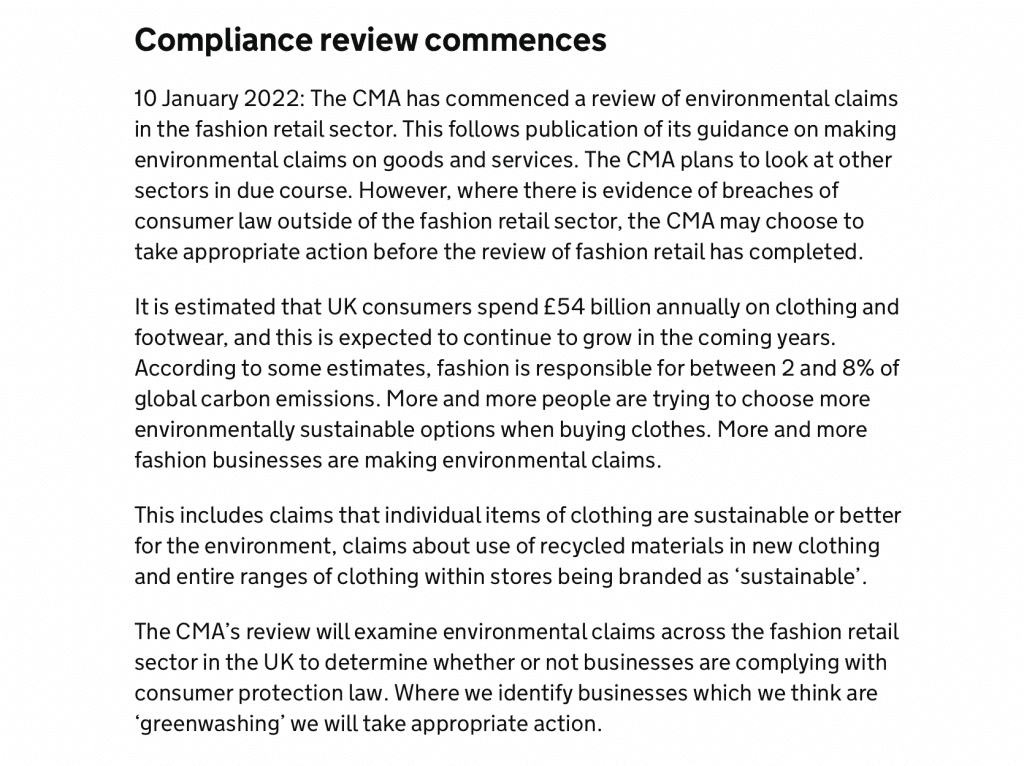The United Kingdom’s Competition & Markets Authority (“CMA”) has published its highly anticipated Green Claims Code, with the competition and consumer protection regulator providing guidance for businesses making environmental claims. The newly-issued Code – which is aimed at “helping businesses understand and comply with their existing obligations under consumer protection law when making environmental claims” and avoid making Greenwashing claims – applies to all businesses across market sectors, and extends to claims made in advertisements, product labelling and packaging or other accompanying information, including product names, and presumably, logos or graphics that are used in connection with companies’ goods/services.
Formally released on September 20, the CMA’s anti-greenwashing Code centers on six key principles that businesses must adhere to in connection with their marketing/advertising operations. Specifically, the Code mandates that green claims must …
(1) Be “truthful and accurate.” Claims “must not mislead consumers by giving them an inaccurate impression, even if those claims are factually correct. They must only give consumers the impression that a product, service, process, brand or business is as green and sustainable as it really is.”
(2) Be “clear and unambiguous.” Claims should be worded in a way which is transparent and straightforward so consumers can easily understand them. They should not be presented in ways that are liable to confuse consumers or to give the impression that a product, service, brand or business is better for the environment than it is.”
(3) Not omit or hide important information (i.e., “information that consumers need to make informed choices.”) The Code notes that “what claims don’t say can also influence the decisions consumers make,” and as such, “It is vital that businesses pay close attention to the information on environmental impacts that consumers need to make decisions and reflect that in the claims they make.”
(4) Include only “fair and meaningful comparisons” that are based on “clear, up to date and objective information.” Comparison should “not benefit one product or brand to the detriment of another if the comparison is inaccurate or false,” and instead, should enable consumers to make informed choices about “competing products and businesses or between different versions of the same product.”
(5) Consider the full life cycle of the product. When making claims, the Code requires that “businesses consider the total impact of a product or service,” noting that “claims can be misleading where they do not reflect the overall impact or where they focus on one aspect of it but not another.”
All aspects of a product’s or service’s environmental impact over its life cycle, including its supply chain, could be important, per the CMA, including: “its component parts; how and where it is manufactured, produced or carried out; how it is transported from its place of manufacture or origin; its use or performance; the disposal of a product, and any waste or by-products; the consequences of any environmental benefit claimed and the period in which it would be realized; and whether the product or service has an overall adverse impact.”
(6) Be substantiated. Businesses should be able to back up their claims with “robust, credible, and up to date evidence.” The CMA states that “most environmental claims are likely to be objective or factual claims that can be tested against scientific or other evidence. Given the requirement that claims must be truthful and accurate, businesses should have evidence to support them.”
In connection with the release of the Code, the CMA revealed that it will carry out a full review of misleading green claims both online and offline beginning in January 2022, but brands are encouraged not to wait until next year to review their claims.
Linklaters LLP attorneys Sara Feijao, Nicole Kar, Vanessa Havard-Williams and Rachel Barrett noted this week that the CMA is expected to “prioritize which sectors [it will most immediately] review in the coming months,” with such target sectors potentially likely to include “industries where consumers appear most concerned about misleading claims – such as textiles and fashion, travel and transport, and fast-moving consumer goods (e.g. food and beverages, beauty products and cleaning products).” It is worth noting, however, that the CMA has emphasized that “any sector where [it] finds significant concerns could become a priority, and if there is clear evidence of breaches of consumer law, [it] may take action before the formal review period begins.”
With this in mind, Feijao, Kar, Havard-Williams and Barrett state that the message from the CMA is clear, “UK businesses have been put on warning: get your house in order now” or face action – and related penalties – under the new Code. Such ramifications could be compounded with penalties under the UK Code of Broadcast Advertising and the UK Code of Non-broadcast Advertising and Direct & Promotional Marketing, as well, both of which contain sections on environmental claims with principles similar to the new Green Claims Code, according to Macfarlanes LLP attorney Rosie Duckworth.
Greenwashing Claims
The release of the Green Claims Code comes seven months after the European Commission announced that a sweeping probe into hundreds of websites and a subsequent closer examination of 344 “seemingly dubious claims” in the EU bloc resulted in a finding that it had reason to believe that in 42 percent of cases of companies making “green” claims, the claims were “exaggerated, false or deceptive.” In more than half of the cases, the Commission found that the claim-making company did not provide “sufficient information for consumers to judge the claim’s accuracy,” while in 59 percent of cases, the company did “not provide easily accessible evidence to support its claim.”
The Commission – which is the EU agency tasked with proposing legislation, implementing decisions, upholding the EU treaties and managing the day-to-day business of the EU – further asserted early this year that in 37 percent of the cases, the potentially problematic claims included “vague and general statements” about a product, such as it being “‘conscious,’ ‘eco-friendly,’ and/or ‘sustainable,’” which the European Commission says is language that aims “to convey the unsubstantiated impression to consumers that a product had no negative impact on the environment.”
At the same time, the CMA, which also collaborated on the International Consumer Protection Enforcement Network-initiated sweep, stated that companies also made “unclear” claims, including “references to ‘natural products’ without adequate explanation or evidence of the claims,” and in some cases, “hid or omitted certain information, such as a product’s pollution levels, in order to appear more eco-friendly.” Still yet, the CMA noted that companies have made use of “eco logos and labels” that appear to indicate some kind of sustainability quality, but that are not “associated with an accredited organization.”
The boom in eco-centric endeavors by consumer goods brands has led to a proliferation of misleading marketing in the sustainability space. The practice ensures, in large part, because much of the terminology being used is often extremely vague (and lacking in formal definitions) … and thus, difficult to police from a legal perspective. That is beginning to change, it seems, as regulators amp up their efforts to police the space in connection with initiatives – and new regulation, such as the Green Claims Code, that experts believe will have real – and lasting – impacts in this space for brands across the globe.
UPDATED (Jan. 10, 2022): The CMA has formally commenced it compliance review of environmental marketing claims in the fashion/retail sector …












